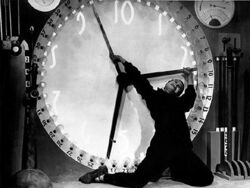UnNews:Recession now affecting time itself; one hour lost Sunday
| Democracy Dies with Dignity | ✪ | UnNews | ✪ | Thursday, September 11, 2025, 03:11:59 (UTC) |
| Recession now affecting time itself; one hour lost Sunday | 
|
7 March 2009
WASHINGTON, DC -- New data unveiled by economists over the weekend shows that the current recession is even worse than thus-far anticipated. The numbers show that the far-reaching effects of the downturn have spread beyond just stocks, housing, and the financial sector, and are now affecting the time-space continuum itself. A study conducted by the Treasury Department proves that precisely one hour of time has been lost on Sunday due to the recession. "Housing prices are falling, the Dow is dropping, and now we're literally losing hours of time," commented a government official.
The situation was deemed so critical that President Obama was awakened at 3 a.m. on Sunday to be told of the news. Anonymous White House sources revealed that the President turned pale when advisers told him that "the hour between 2 a.m. and 3 a.m. simply disappeared." Furthermore, Federal Reserve Chief Ben Bernanke warned there is nothing more his agency can do to try to prevent further time loss because the prime interest rate is already at 0%.
Economists warn that the time loss could cause a downward spiral that will further weaken the economy. "With only 23 hours in the day, there is less that can be produced, and less time for consumers to spend money," explained Dr. Hanke of the Time-space Economy Think Tank, adding that "a higher rate of unemployment and a lower GDP will inevitably lead to even more hours being lost."
One piece of good news buried in the dire report is that so far it looks like only the United States was affected by the time loss. "Thankfully Europe is still holding on to a 24 hour day, but statistical models suggest it won't be for long." Prime Minister Gordon Brown of Great Britain convened an emergency summit to prepare his country for the possible loss of one or more hours, something that "hasn't happened in our country since the depression in the 30s." At the peak of the Great Depression in 1933, up to 5 hours were being lost per day.
In the U.S., President Obama addressed the nation to calm people's fears. He also vowed to push Congress to introduce
new legislation that would deal with the time loss problem. "In these tough times, we cannot afford to lose even one more
minute," Obama carefully read from his teleprompter, "which is why I propose that sometime in the fall, perhaps a week
after Halloween, we should add one hour to the day to compensate for this weekend's loss." However, Republicans on Capitol Hill
already voiced opposition to such legislation, with minority leader John Boner Boehner claiming that "the Democrats once again want to bend the laws of nature
and take control of time away from God."
Sources
- AP Staff "Time to set clock ahead an hour at 2 a.m. Sunday". AP, March 7, 2008
| Featured version: 12 March 2009 | |
| This article has been featured on the main page. — You can vote for or nominate your favourite articles at Uncyclopedia:VFH. | |

